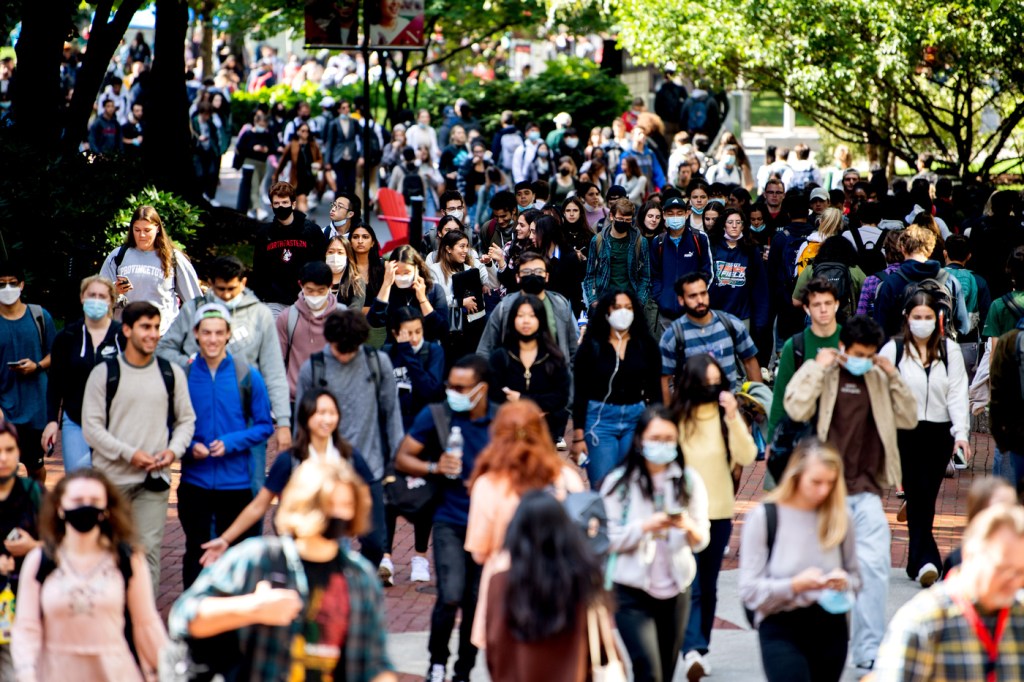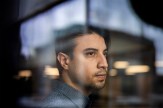Northeastern is moving to optional weekly COVID-19 testing

In a move that signals the next phase of COVID-19 management, Northeastern University is ending its required weekly surveillance testing at the end of the month and instead moving to optional weekly testing for asymptomatic individuals.
Along with the shift, members of the Northeastern community will no longer need to complete daily wellness checks before going to campus; instead, the checks will be required only when arriving for a COVID-19 test. Testing will still be required for people experiencing symptoms. The change goes into effect on Monday, Feb. 28, at which point the university will also discontinue use of its COVID-19 dashboard.
“We will continue to monitor developments and adapt our approach as needed,” university officials wrote in a statement. “From the very beginning of the pandemic, our community of faculty, staff, students, and others joined together to become a model of flexibility, resilience, and mutual support.”
Northeastern has been testing all students, faculty, and staff for COVID-19 since mid-August 2020. Blanket “surveillance testing,” as it is known, of the entire community was a highly effective strategy to identify pockets of positive cases and isolate those individuals from the rest of the university population before they could infect others.
The robust testing system, which included the creation of an in-house testing lab—the Life Sciences Testing Center in Burlington, Massachusetts—enabled Northeastern to safely bring students, faculty, and staff back to campus for the 2020 fall semester.
In the nearly two years since then, however, the COVID-19 landscape has changed dramatically, both on the university’s campuses and around the world. The U.S. has made “tremendous progress” in its ability to protect against the virus, White House coronavirus response coordinator Jeff Zients said Wednesday. The country is “moving toward a time when COVID isn’t a crisis, but something we can protect against and treat,” he said.
Northeastern’s shift away from required surveillance testing is a marked step toward a new normal that includes living with the virus—one that received mixed reviews from students interviewed about the policy change.
Sam Block, a second-year student of computer science, says he supported the change, and that COVID-19 has faded into something that “isn’t too big of a worry” anymore.
On the other hand, Arya Venkat, a first-year student of economics, says that the mandatory surveillance testing offered her peace of mind in a younger population where infection doesn’t always come with symptoms. Still, she says she’s open-minded about relaxing various restrictions as public-health guidance dictates.
Jared Auclair, who is an associate teaching professor of chemistry and chemical biology at Northeastern and runs the university’s COVID-19 testing facility, says the change is “a logical step.”
“As we transition to the next stage of the pandemic within the university, we’re not taking testing away. We’re just saying that we are no longer doing asymptomatic surveillance testing,” he says. “Symptomatic people should still test. And testing is optional for anybody else who feels like they need to get a test.
“We’re not turning it off,” Auclair says. “We’re just moving to a place where it’s optional if you don’t have symptoms, and if you have symptoms you have to get tested. And I think that’s a logical step.”
Indeed, there are a lot more tools in the pandemic toolbox than there were two years ago. Now, vaccines against SARS-CoV-2, the virus that causes COVID-19, are widely available in the United States and many other parts of the world—and Northeastern requires all students, faculty, and staff at its North American campuses to be fully vaccinated. Additionally, doctors have treatments that they can use to reduce the risk of an infection becoming fatal, and the virus itself seems to be mutating in a way that makes it less severe (albeit more infectious).
University officials are evaluating mask requirements for all of Northeastern’s campuses, as well—decisions that are informed by local public health guidance. The City of Boston has yet to lift its indoor mask requirements. At other campus locations, including Nahant and Burlington in Massachusetts, London, and the San Francisco Bay Area, indoor mask requirements already have been lifted, and indoor mask-wearing is optional at those sites.
For media inquiries, please contact media@northeastern.edu.





